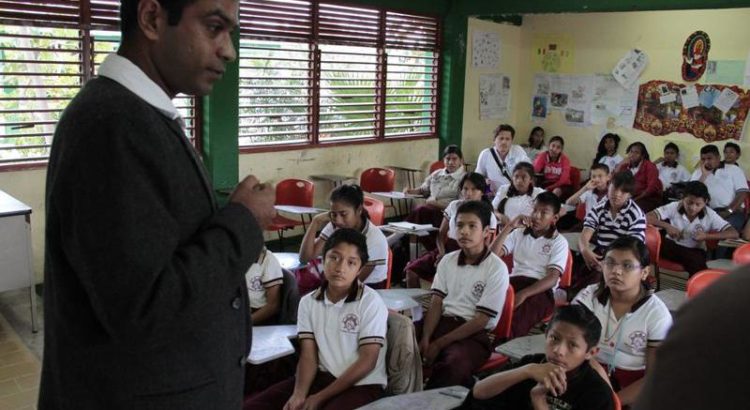Indian/February 13, 2018/By: PTI/ Source: http://www.newindianexpress.com
Communication in English, cost of extracurricular activities and «inadequate reimbursement» on education expenditures are major reasons for students from economically weaker sections and disadvantaged groups dropping out of private schools in Delhi, says a study by NCPCR.
The study on ‘Implementation of Section 12(1) (c) of Right To Education Act, 2009 in Delhi pertaining to Admission of Children from Disadvantaged Sections in Private Schools’ also found that the dropout rate in 2011 was around 26 per cent, which came down to 10 per cent in 2014.
The section 12 (1) (c) of the RTE Act fixes the responsibility of private unaided schools to provide free and compulsory education to children from weaker and disadvantaged sections by admitting at least one-fourth of the total strength of class 1 or pre-school education.
«In the initial phase in 2011, the dropout rate was at around 26 per cent which has come down to 10 per cent in 2014 but shows no major progress after that.
«The dropout percentage, particularly at the entry level class i.e. primary and pre-primary and major share of the dropout is at the primary level,» according to the study conducted by the National Commission for Protection of Child Rights (NCPCR).
The study by the apex body for protection of child rights in India was based on data submitted by 650 schools across Delhi on year-wise dropout rates.
The study highlights that one of the main «excuses» given by a school is that after allotment (under EWS category), parents did not show interest for admission while the institute also did not try to follow-up with them.
«Due to lack of follow-up by the school or authorities, the seats remain vacant,» it said.
«Parents claimed that books and extra-curricular activities cost a lot, which pushed them to leave school,» the study said.
It also flagged concern over another trend noticed about dropouts — that schools have no clarity on what next steps they need to follow in case the EWS/DG category students leave school or don’t join at all.
According to documents collected by the NCPCR during onsite visit of schools, in case the child does not join their school at all then it needs to send a notification to the DoE stating that the student allotted to them has not joined and the seat is empty but it is not practiced when the student leaves in between for personal reason.
«As per the analysis of the data, it is clear that most of the schools don’t take any initiative to fill the empty seats while few try filling it with general category students.
The schools quote absence of proper guidelines from the DoE to maintain the ratio till class 8 as a reason of not taking admission after entry class,» the study said.
However, section 12 (1) (c) clearly states that the school shall admit in class 1, to the extent of 25 per cent of total strength of that class and provide education till completion of elementary education.
The RTE Act, 2009 nowhere restricts the schools from taking admission in any other elementary level class to maintain the 25 per cent ratio, it said.
According to the guideline of the Directorate of Education, all schools are allotted an amount of Rs 1,598 per EWS student per month as tuition fee reimbursement.
For books and uniforms, all schools are expected to fill in details of the expenditure incurred in a given format and submit it to the DoE. The amount claimed gets reimbursed via cheque to the school and is then distributed to the students.
The schools are supposed to submit utilisation certificate within a month of the receipt of the cheque.
«Parents have complained that cost of books and extra curricular activity is too high and the reimbursement amount is not enough,» the study said.
It quoted a parent as saying that, «I pay around Rs 3,100 per quarter to the school for my son. Apart from that I spend about Rs 12,000 on his books. His uniform cost is extra. In case the school takes the child for picnic, I pay for it.»
One of the major reasons for higher cost of books in private schools is the violation of section 29 (1) of the RTE Act i.e. when the curriculum and evaluation procedure laid down by the academic authority is not followed, according to the study.
Suggesting the way forward, the NCPCR stressed then need for conducting regular orientation programmes for teachers and principals on how to include the children in EWS/DG category in the mainstream.
It said similar to the in-service training of government school teachers, training of private school teachers should be conducted by respective schools through the District Institutes for Education and Training (DIETs).
Noting that section 12 (2) of the RTE Act states that the total expenditure on education has to be reimbursed by the State, it said these children should be included in important co-curricular activities conducted in the school.
The NCPCR also suggested that the medium of instruction should as far as possible be mother tongue and schools should make efforts for multilingual teaching, besides prescribing NCERT books and their use be strictly implemented, especially in schools affiliated to CBSE/ICSE or any other private board.
Source:
http://www.newindianexpress.com/cities/delhi/2018/feb/11/english-cost-of-education-in-private-schools-reasons-for-dropout-in-delhi-study-1771732.html








 Users Today : 3
Users Today : 3 Total Users : 35460266
Total Users : 35460266 Views Today : 4
Views Today : 4 Total views : 3418972
Total views : 3418972